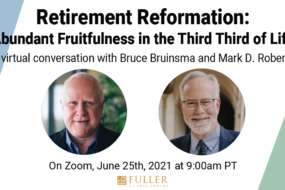September 13, 2016 • Life for Leaders
Others, like seed sown on good soil, hear the word, accept it, and produce a crop—some thirty, some sixty, some a hundred times what was sown.
Mark 4:20
 Do you want to live a fruitful life? Do you want your life to contribute to the good of this world, not to mention the goodness of God’s kingdom?
Do you want to live a fruitful life? Do you want your life to contribute to the good of this world, not to mention the goodness of God’s kingdom?
I expect you answered, “Yes” to these questions. We are wired from the beginning for fruitfulness. It’s part of our psychological/spiritual DNA. You’ll recall God’s very first instruction to humankind: “Be fruitful and increase in number, fill the earth and subdue it” (Gen 1:28). “Be fruitful” – we were made for this and, even though sin has confused our yearnings, we desire fruitfulness nevertheless.
Jesus’ so-called Parable of the Sower, or, perhaps, Parable of the Soils, assumes that fruitfulness is something to be desired. The seeds that fell on good soil “produced a crop, some multiplying thirty, some sixty, some a hundred times” (4:8). In his interpretation of the parable, Jesus explains that some listeners to God’s Word “like seed sown on good soil, hear the word, accept it, and produce a crop – some thirty, some sixty, some a hundred times what was sown” (4:20).
Follow the line of this parable, what is required if we are going to live lives of abundant fruitfulness? There are at least three key ingredients. First, there is the sower, the one who communicates God’s Word to us. This could be a human sower, though ultimately God is the one who broadcasts his Word. Second, there is the seed, the message, and the good news of the kingdom of God. We will live lives of maximum fruitfulness when we have heard and responded favorably to the Gospel. Thus, third, there is the soil. For the seed of God’s Word to flourish, it must be planted in good soil, that is to say, in people who are receptive, willing, and eager to have the Word grow in their lives. Good soil doesn’t just respond with a momentary emotional reaction to the Gospel. Rather, it provides a context for God’s Word to grow deep, thus producing roots that are essential for abundant fruitfulness.
As you think of your life, are the three ingredients of fruitfulness to be found? Do you regularly hear the teaching of God’s Word? Is your life centered in the Gospel? Have you welcomed God’s Word, not just in a momentary happiness, but also in a life of allowing the Word to grow deep so that it might flourish in your life?
QUESTIONS TO CONSIDER:
Take some time to consider the questions listed above.
PRAYER:
Gracious God, thank you for sowing your Word among us. Thank you for helping us to hear, understand, and respond in faith.
May our faithful response be something that lasts as we allow your Word to penetrate our hearts. May it grow deep within us so that it might ultimately bear abundant fruit.
All praise be to you, Gracious Sower. Amen
Explore more at the Theology of Work Project online Bible commentary: Parables at Work (Mark 4:26-29 and 13:32-37)

Dr. Mark D. Roberts is a Senior Strategist for Fuller’s Max De Pree Center for Leadership, where he focuses on the spiritual development and thriving of leaders. He is the principal writer of the daily devotional, Life for Leaders, and the founder of the De Pree Center’s Flourishing in the Third Third of Life Initiative. Previously, Mark was the Executive Director of the De Pree Center, the lead pastor of a church in Southern California, and the Senior Director of Laity Lodge in Texas. He has written eight books, dozens of articles, and over 2,500 devotions that help people discover the difference God makes in their daily life and leadership. With a Ph.D. in New Testament from Harvard, Mark teaches at Fuller Seminary, most recently in his D.Min. cohort on “Faith, Work, Economics, and Vocation.” Mark is married to Linda, a marriage and family counselor, spiritual director, and executive coach. Their two grown children are educators on the high school and college level.





pete bray here! hello and very sorry to hear of the passing of Mr Butt…..I am having difficulty receiving my daily devotional..I have subscribed several times and never receive the daily e-Mails, could you help?